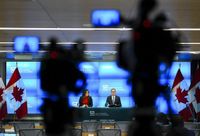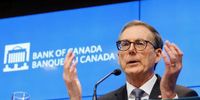OTTAWA — A pair of reports from the Bank of Canada released on April 7, 2025, indicate a significant decline in business and consumer confidence, as well as rising concerns about a potential recession in the coming year. The Business Outlook Survey (BOS) revealed that 32 percent of firms now anticipate an economic downturn, a sharp increase from just 15 percent over the previous two quarters. Meanwhile, consumer sentiment has also soured, with 67 percent of Canadians expecting a recession, up from 47 percent in the last quarter.
The BOS data, collected through interviews conducted from February 6 to February 26, 2025, reflects sentiments prior to the announcement of new tariffs by U.S. President Donald Trump. In mid-March, Trump imposed 25 percent tariffs on Canadian steel and aluminum, followed by similar tariffs on automobiles on March 26. The uncertainty surrounding these trade measures has left many businesses apprehensive about future sales and investments.
According to the Bank of Canada, the escalating trade conflict with the United States, coupled with domestic political uncertainties, has become a primary concern for firms. Nearly 40 percent of businesses surveyed believe that if tariffs are implemented, they will experience lower sales growth. Additionally, 22 percent reported that trade uncertainties have caused them to halt their investment plans.
Hiring intentions have also taken a hit. Only 32 percent of firms indicated they plan to increase their workforce over the next year, the lowest percentage since the fourth quarter of 2015. This cautious approach to hiring reflects a broader trend among businesses delaying critical decisions until they gain a clearer understanding of the economic landscape.
The survey highlighted that nearly 45 percent of firms expect to pass on some or all of the increased costs from tariffs to consumers. However, 31 percent of businesses do not anticipate any impact on their input prices from the tariffs. Concerns about inflation are palpable, with businesses expecting the consumer price index (CPI) to rise by 3.6 percent over the next year, driven largely by tariff-related costs.
Consumer sentiment mirrors this pessimism. The Bank of Canada's Consumer Expectations Survey revealed that trade uncertainties are raising fears about job security and financial stability. One respondent noted, "I’m definitely spending less and saving more because the future is so uncertain. I like to be ahead of what might happen in the economy for example, my job security might get worse." This shift in consumer behavior is evident, with many planning to reduce their overall spending for the first time since early 2024.
As businesses brace for potential price hikes due to tariffs, the outlook for inflation has worsened. Two-thirds of firms believe their costs will rise if tariffs are enacted, prompting many to consider increasing their selling prices. This anticipated inflationary pressure could undermine efforts to keep inflation expectations stable, as firms predict that the impact of tariffs will outweigh any downward pressure from weak demand.
In a broader context, the Bank of Canada’s reports suggest that the economic outlook remains precarious. The central bank's outlook indicator, which measures business sentiment, fell to minus 2.14, down from minus 1.16 at the end of 2024, indicating a reversal of the positive trend seen in previous quarters. The proportion of businesses expecting improved sales growth has also decreased, with only 43 percent optimistic about future sales compared to 53 percent in the fourth quarter of last year.
Investment plans have similarly declined, with just 31 percent of businesses expecting to increase spending on machinery and equipment, down from 48 percent in the previous quarter. This cautious stance reflects a broader hesitance among firms to commit to new projects or expansions amid an uncertain economic climate.
The Bank of Canada is set to make its next interest rate decision on April 16, 2025, following a recent cut to its key interest rate by a quarter percentage point to 2.75 percent. The decision to lower rates was influenced by the significant uncertainties surrounding U.S. tariffs and their potential impact on the Canadian economy.
As the situation evolves, economists are closely monitoring both business and consumer sentiment. BMO senior economist Shelly Kaushik commented, "Tariffs dominated business and consumer sentiment in the first quarter, with plenty of uncertainty about whether they would be levied, at what rate, and for how long. Given that uncertainty remains and tariffs are now in place, we expect weakness to persist in the coming quarters."
The Bank of Canada’s findings underscore the interconnectedness of global trade and domestic economic health, particularly for a country like Canada, which relies heavily on exports to the U.S. for about one-fifth of its gross domestic product. As businesses and consumers navigate this challenging landscape, the potential for a recession looms larger, prompting calls for clarity and decisive action from policymakers.









